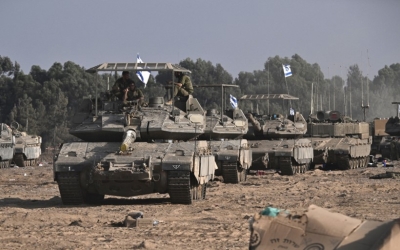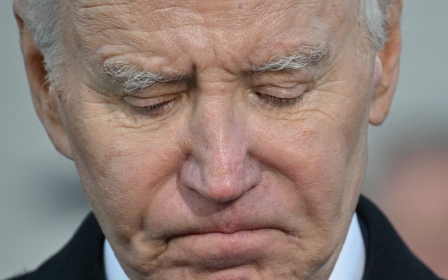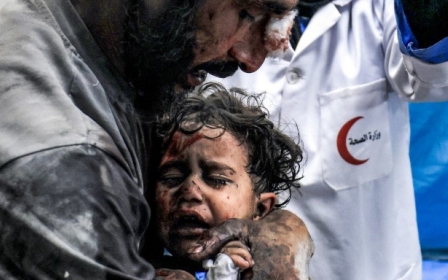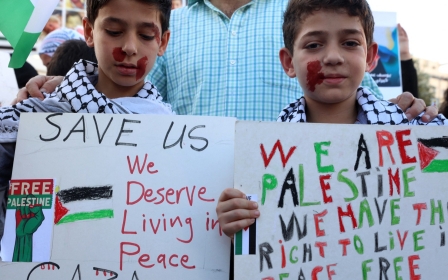Israel-Palestine war: Did we learn nothing from Iraq?

Two weeks ago, Palestinian journalist Plestia Alaqad said on Instagram: “We’ve reached the point where we are happy when we hear someone was killed in one piece.”
Her comment gave me chills not only for the horror it so perfectly encapsulated, but also because it sounded so familiar.
When my grandfather passed away at the height of the Iraq war, our Iraqi-American immigrant community consoled us with: “At least you have a body to bury.” Car bombings and rocket strikes made a proper funeral a luxury in Iraq.
This is one of several similarities that have haunted me since Israel’s declaration of war on Gaza.
When US President Joe Biden said Hamas had “unleashed pure, unadulterated evil in the world”, I heard an echo of former President George W Bush’s “axis of evil” speech, and his argument that “either you are with us, or you are with the terrorists”.
New MEE newsletter: Jerusalem Dispatch
Sign up to get the latest insights and analysis on Israel-Palestine, alongside Turkey Unpacked and other MEE newsletters
Then came the statements about how Hamas’s use of “human shields” justifies the bombing of schools, churches and hospitals, which reminded me of past claims that Iraq supported terrorist groups and had weapons of mass destruction, requiring our immediate intervention.
Several Israeli figures have called 7 October the country’s 9/11 moment, a disturbingly apt description. It, too, was a moment in history when a recently attacked nuclear superpower was firing on a population with no culpability, save for living in an area of strategic interest.
Images of abuse
More recently, the appalling videos of Palestinian men being tortured by Israeli soldiers bear a shocking resemblance to the images of abuse that emerged from Iraq’s Abu Ghraib prison. An alarming increase in hate crimes also parallels the spikes seen during the US-led “war on terror”.
While the similarities do not end there, I do not want to overstate them either. Iraq is a nation with uncontested borders, its own military, and control over its own resources.
Follow Middle East Eye's live coverage for the latest on the Israel-Palestine war
Although the cause for war with Iraq has widely been discredited, the US military planned a strategic invasion of Iraq, as opposed to the genocide by way of carpet bombing that we are witnessing now.
I only draw this comparison to ask: after more than 300,000 Iraqi civilian lives were lost due to our nation’s misguided foreign policy, how can we, as a people, still believe in our politicians’ justifications for war? With this blood still fresh on our hands, how can there be any disagreement as to the absolute imperative of a ceasefire now?
I fear we will only lament the course of action that led to such an incomprehensible death toll in Palestine after it's far too late
As with Iraq, I fear we will only lament the course of action that led to such an incomprehensible death toll in Palestine after it’s far too late.
While today there are few who would argue that the case for the Iraq War was just, I still remember the young woman in an airport who argued its necessity with: “But there’s no telling what those people will do.” Or the woman who criticised an essay of mine for being a “politically correct cheap shot” when “we liberated Iraq”.
Or the countless times I was asked why Muslims don’t condemn terrorism, as if the nearly two billion Muslims worldwide had a central command that could issue a public statement to end global terrorism.
'Us vs them'
While it’s a relief to no longer have to argue the unjustness of the Iraq War, it has been excruciating to hear people speaking the discourse of war once again.
Biden has exploited the threat of terrorism by saying: “History has taught us that when terrorists don’t pay a price for their terror … they cause more chaos and death and more destruction.” Interviewers ask their traumatised Palestinian guests: “But do you condemn Hamas?”
Politicians and analysts argue for Israel’s “right to defend itself”, even when it is in clear violation of international law. This “us vs them” framing permeates the way people speak to each other online, at work and in classrooms, further dividing us while a humanitarian crisis of untold proportions continues to unfold.
For nearly 40 days, we’ve watched an ethnic cleansing through the first-hand lens of journalists and civilians on the ground. Social media has shown us a father carrying the remains of his children in two plastic bags, a mother embracing her shrouded child, a father sorting through the rubble, desperately calling out the names of his children, in search of some sign of life.
Families writing the names of their children on their bodies so they can later be identified, and then later families sorting through limbs and pieces of bodies for such a scrap of identification.
Even animals have not been spared, and in their hunger, dogs are eating the bodies of the abandoned dead at the bombed out al-Shifa hospital.
The side of humanity
My mind travels back to the luxury of a funeral, the luxury of burying a relative in the ground, the luxury of grief, the luxury of people caring about your loss.
I can think of no greater denial of a people’s humanity than to take away even their right to bury their dead
Anyone who has ever lost a loved one knows there is nothing more sacred than carrying out these last rites, that there can be no healing if your loved one has not been properly laid to rest. I can think of no greater denial of a people’s humanity than to take away even their right to bury their dead.
After wars, we console ourselves that maybe we’ve learned something, that maybe the incalculable loss of life did, indeed, deliver us to a safer, wiser world.
After being sold an unjust war only 20 years ago, I would have thought that we’d be better at recognising a political and economic agenda operating under the guise of “self-defence”; that we’d learned to reject the indiscriminate use of force not only against people, but against our ailing planet.
And that we’d finally come to understand, irrevocably, that we’re all on the same side - the side that is vulnerable to the decrees of those in power, governed by leaders who do not act with our best interests at heart.
The side of humanity.
The views expressed in this article belong to the author and do not necessarily reflect the editorial policy of Middle East Eye.
Middle East Eye delivers independent and unrivalled coverage and analysis of the Middle East, North Africa and beyond. To learn more about republishing this content and the associated fees, please fill out this form. More about MEE can be found here.






